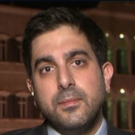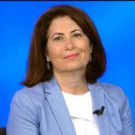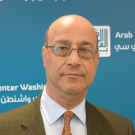Speakers

Halim Shebaya
Executive Director
Arab Association of Constitutional Law

Randa Slim
Director of the Conflict Resolution and Track II Dialogues Program
Middle East Institute
Moderator
Webinar Summary
On September 28, 2021, Arab Center Washington DC (ACW) presented a webinar titled “Will Miqati’s Government Be Able to Deliver for Lebanon?” Speakers were Patricia Karam, Regional Director of the Middle East North Africa Division at the International Republican Institute; Halim Shebaya, Executive Director of the Arab Association of Constitutional Law; and Randa Slim, Director of the Conflict Resolution and Track II Dialogues Program at the Middle East Institute. Imad K. Harb, Director of Research and Analysis at ACW, served as moderator.
Patricia Karam explained that the impending social, economic, and political collapse in Lebanon is manifest in pervasive economic deterioration, severe currency devaluation, inflation and unemployment, insolvent banks, worsening social services, and shortages of necessities such as food, fuel, and medicines. She said that there is attrition in the middle class and a general experience of destitution in the population as well as disintegration of state structures. As for education, Karam noted that it has suffered a blow with the departure of teachers and the rampant electricity and fuel shortages, which render students unable to pursue education online; she added that this affects vulnerable children even more, and they are facing the prospect of never returning to school. In addition, health care has deteriorated with an exodus of many nurses and doctors. Such conditions, she said, have pushed poor Lebanese into deeper poverty; a recent report by the United Nations Economic and Social Commission for Western Asia found that 82 percent of the population live in “multidimensional poverty,” lacking at least one of the following: a stable income, access to housing, health care, or education. Karam said that the population’s expectation of revolutionary change, after the October 2019 demonstrations, were dampened because the political establishment was able to weather the storm and use the pandemic to defuse the situation. However, public frustration reached new heights after the Beirut Port blast of August 2020, which exposed the extent of government corruption.
The lack of a functioning government for the last 13 months, Karam stated, precipitated the suspension of the investigation into the blast, reflecting what she termed a symbiosis between the kleptocratic political class and Iranian superintendence. Prime Minister Najib Miqati’s new government, Karam argued, is “more of the same”: its primary aim is to boost the standing of Lebanon’s political apparatus. Aid from the International Monetary Fund and other international donors is contingent on Lebanon’s formation of a government and implementation of measures to end systemic corruption. However, she said that the Miqati government will implement cosmetic reforms to secure votes for Lebanon’s traditional sectarian parties and stifle any political opposition; ultimately, the government’s purpose is to gain a lifeline from the international community to sustain the existing situation. The political class, she continued, is disinterested in addressing the most basic grievances and, further, has normalized corruption in Lebanon.
Halim Shebaya addressed the prospects of success for the new Lebanese government and if it will be able to answer the demands for transparency in dealing with public funds and for an independent judiciary and respect for the rule of law. Shebaya said that it would be a mistake to view the Miqati government in isolation from the historical context of previous governments in Lebanon, saying that the cabinet includes representation from various political factions in the country. He asserted, however, that it is comprised of personalities from the same previous regimes and, notably, that it is a government formed by the establishment and it will govern for the establishment. To that point, he stated that members of these political elites are attempting to remove the judge, Tarek Bitar, who is thoroughly investigating the port blast, saying that this reflects the establishment’s continuing push for immunity and non-accountability. Shebaya said that Lebanon did not conduct parliamentary elections between 2009 and 2018. In a recent interview, Miqati announced that he is looking to hold elections in March (rather than in May) 2022.
Shebaya argued that the regime in Lebanon is banking on the expectation that the population is getting used to the insufferable conditions at present in the country; however, although the changes needed are to assert the independence of the judiciary and combat corruption, it is clear that this establishment will be ruthless in trying to reproduce itself. This points to the fact, he said, that when trust has been broken between the public and state institutions, confidence building measures will be needed by the state to signal to the public that reforms have been made. When asked how longer-term change could be achieved in Lebanon, particularly in an overhaul of the present government, Shebaya answered that there would have to be an umbrella of a clear opposition movement, one that would have to formulate a strong message of an alternative to the status quo. This movement would need organization and money. He added that it must unite people on clear principles independent of Iran, the Gulf regimes, and the United States; otherwise, the people will “see right through them.”
Randa Slim started her remarks by asking, what can the United States and the international community do to help Lebanon resolve its economic crisis? Where do the traditional external powers stand in assisting Lebanon? Slim said that France, the United States, and Saudi Arabia have been the three principal external players in Lebanon for a long time. When France and the United States have worked together, she added, initiatives were more likely to succeed. Although French President Emmanuel Macron has invested personally in advancing aid to Lebanon by visiting the country and hosting international donor conferences, she noted, he may divert his attention domestically as France enters its own presidential elections cycle. This may force the United States to “do the heavy lifting” going forward. If Lebanon were to fully collapse, Slim predicted, it would take decades to repair and would likely lead to a resurgence of the Islamic State and al-Qaeda, more Lebanese refugees fleeing to Europe, and further expansion of influence by Hezbollah and Iran in the country. Slim agreed with Shebaya and Karam that the government that will be elected will continue to center the interests of the establishment. She explained that the Lebanese Armed Forces (LAF) remain the last standing pillar of Lebanon—all other major institutions, like the central bank, that underpin the state are ruined and have lost credibility. The LAF, she added, could provide the security and focus for rebuilding the state.
Although recent Iranian fuel shipments violate US sanctions, Slim said, Washington has chosen not to intervene so that fuel reaches Lebanese institutions. The United States supports a plan to bring gas and electricity from Egypt and Jordan through the Arab Gas Pipeline, she added. Saudi Arabia, the traditional economic and political player in Lebanon, has stood firm that it will not reengage in any way that would buttress the status quo there. For its part, Russia views Syria and Lebanon as interrelated in security and economics, Slim explained. Moscow has been engaging with all the actors and leaders, and economically, Russian companies are investing in the oil sector and have interests in the Lebanese banking networks in Africa. In general, Moscow is wary of Iranian and Hezbollah entrenchment in Lebanon, and it employs a mix of competition and cooperation to counter it. Turkey, too, aims to have a footprint in Lebanon, Slim remarked, and it also sees Lebanon as part of its policy toward Syria. As a conclusion, Slim said she was less optimistic about the possibility of serious reforms in Lebanon after the elections in 2022, as they would be tough on both the establishment and the Lebanese people should they materialize.


